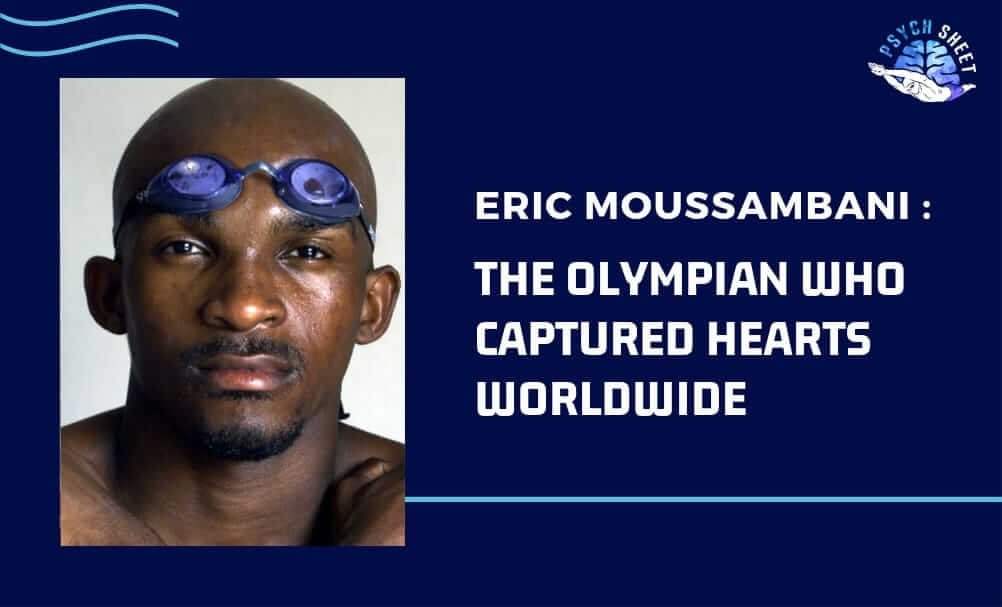Eric Moussambani: The Olympian Who Captured Hearts Worldwide

Eric Moussambani, a swimmer from Equatorial Guinea, became famous during the 2000 Sydney Olympics. He didn’t win a medal but captured everyone’s heart by showing true Olympic spirit. Eric’s story is all about perseverance and courage. He showed the world that being in the Olympics isn’t just about winning. It’s about participating and doing your best, no matter how hard it seems.
Despite being less experienced and having limited resources, his effort in the swimming pool inspired many people worldwide. Eric Moussambani’s journey reminds us that determination and heart are as important as finishing first.
Eric Moussambani: Early Life and Introduction to Swimming
Eric Moussambani, a swimmer from Equatorial Guinea, had a humble beginning in the world of competitive swimming. Growing up in a country with limited sports facilities, he faced many challenges. Remarkably, Eric didn’t have access to an Olympic-sized swimming pool and only learned to swim in 1999, just one year before the Sydney Olympics.
He practiced in a small hotel swimming pool, which was much smaller than the standard pools used in Olympic competitions. Despite these limitations, Eric Moussambani’s determination to improve and compete was strong, showing incredible dedication to his sport under challenging circumstances. His story is a powerful example of perseverance and commitment.
The Road to Sydney 2000
Eric Moussambani’s path to the Olympics started when he received a wildcard entry through the Olympic solidarity program. This program is designed to give athletes from developing countries a chance to compete on the world stage. Known affectionately as “Eric the Eel” by media outlets and fans, Moussambani quickly became a favorite.
His story of underdog determination resonated deeply with people all over the world. Despite less access to training facilities than athletes from wealthier nations, Eric’s spirit and will to compete at the Sydney Olympics showed his incredible drive and resilience. This remarkable journey made Eric Moussambani a symbol of perseverance and the true spirit of the Olympics.
The Memorable Olympic Race
One of the most unforgettable moments in Eric Moussambani’s Olympic journey occurred during the preliminary heats of the 100-meter freestyle at the Sydney Olympics. In an unexpected turn of events, Eric’s competitors were disqualified for false starts, leaving him to swim the race alone—an unusual and challenging situation in Olympic swimming. As he took on the pool by himself, the entire world watched. Eric struggled to complete the race, clearly becoming exhausted halfway through.
Despite these challenges, the audience began to cheer him on passionately. Their support grew louder with each stroke he took, encouraging him to keep going. Eric Moussambani finished the race in 1 minute and 52.72 seconds—the slowest time in Olympic history for that event—but completing it was a victory in itself. His determination to finish, despite obvious fatigue, touched the hearts of millions watching and made him a symbol of the Olympic spirit. Eric Moussambani’s perseverance and courage in that race exemplified what the Olympics are all about, earning him admiration worldwide.
The Impact of His Performance
Eric Moussambani’s performance at the Sydney Olympics was more than just a swim; it was a powerful demonstration of the human spirit and resilience. Though he didn’t win a medal, Eric’s effort captured people’s hearts worldwide. His story reminded everyone that the Olympics are about uniting people and celebrating victories and the effort and spirit each athlete brings.
Eric’s journey also shed light on a larger issue—the significant disparities in training facilities between athletes from wealthier nations and those from poorer regions. His experience swimming in a small hotel pool, compared to the state-of-the-art facilities available to other competitors, highlighted the challenges faced by athletes from less affluent countries.
This exposure helped raise global awareness about the need for improved sports infrastructure and more accessible training opportunities in developing countries. Eric Moussambani’s story goes beyond sports; it is a call to action to support and uplift athletes worldwide, giving everyone a fair chance to compete and excel.
Life After Sydney
After his memorable appearance at the 2000 Sydney Olympics, Eric Moussambani did not fade away from the swimming scene. Instead, he became a national hero in Equatorial Guinea and worked hard to improve his swimming skills. Over the years, he significantly lowered his personal best times, although he never returned to the Olympics due to visa issues in 2004 and not qualifying in 2008.
Eric also took on a new role as a coach, dedicating himself to inspiring and training the next generation of swimmers in his home country. His experience and story as an Olympian continue to inspire young athletes worldwide to chase their dreams, no matter their circumstances.
Eric Moussambani’s journey from an Olympic underdog to a respected coach and mentor shows that with determination and hard work, you can make a lasting impact both in and out of the sports arena. His legacy is not just about his performance but also about how he continued to contribute to sports and mentor young swimmers, showing them that anything is possible with perseverance and passion.
Conclusion
Eric Moussambani’s story embodies the Olympic motto: “The most important thing in the Olympic Games is not to win but to take part.” His unexpected journey to and participation in the Sydney Olympics is a powerful inspiration, showing that the spirit and heart you bring to the competition are as valuable as any medal.
Although Eric Moussambani did not leave Sydney with a medal, he won people’s hearts worldwide, truly defining what it means to be an Olympian. His determination and perseverance remind us all of the deeper values of the Olympics. Eric Moussambani’s story continues to inspire, proving that with courage and effort, anyone can achieve greatness. For more swimming-related information or to learn more about inspiring stories like Eric’s, you can always get in contact with Psychsheet.
